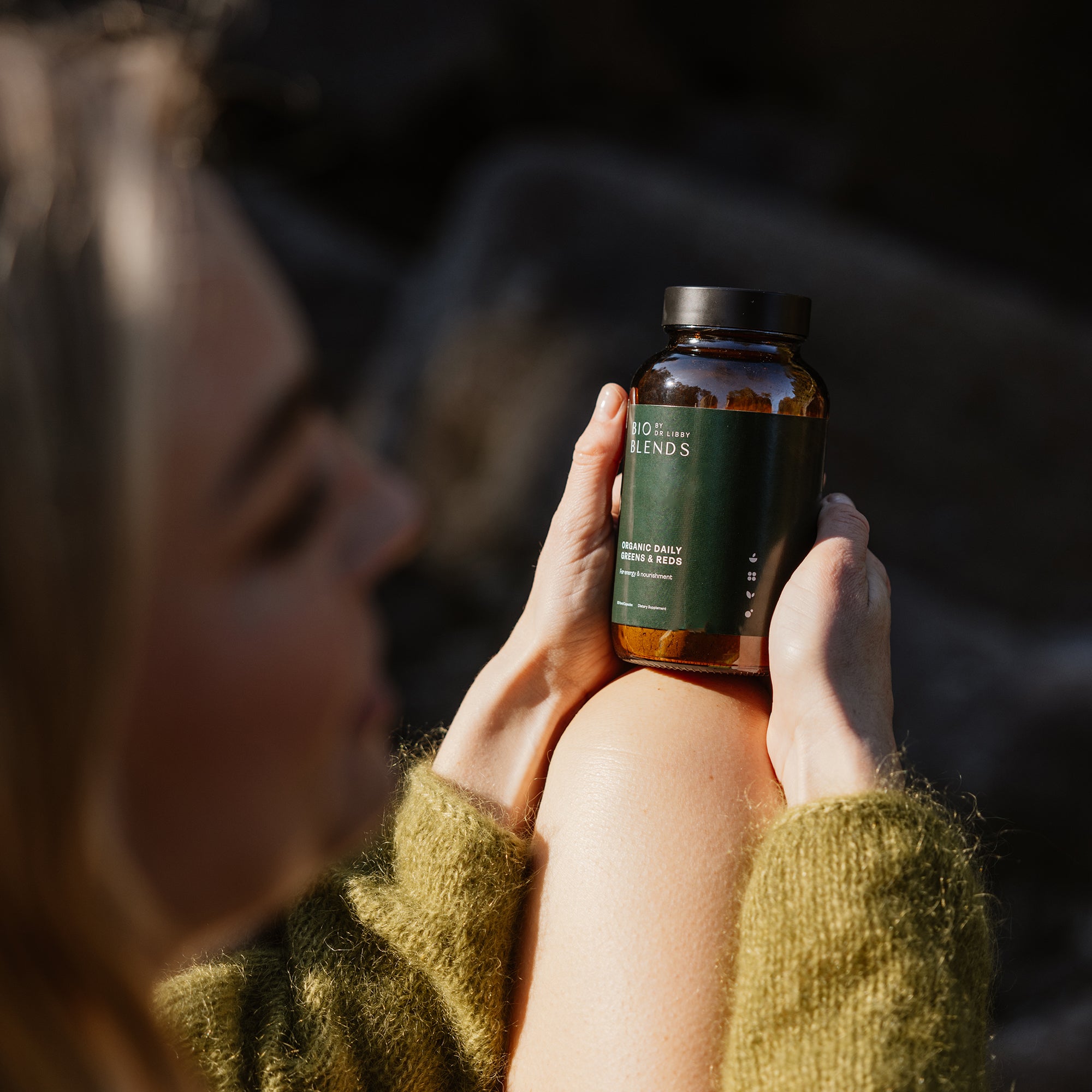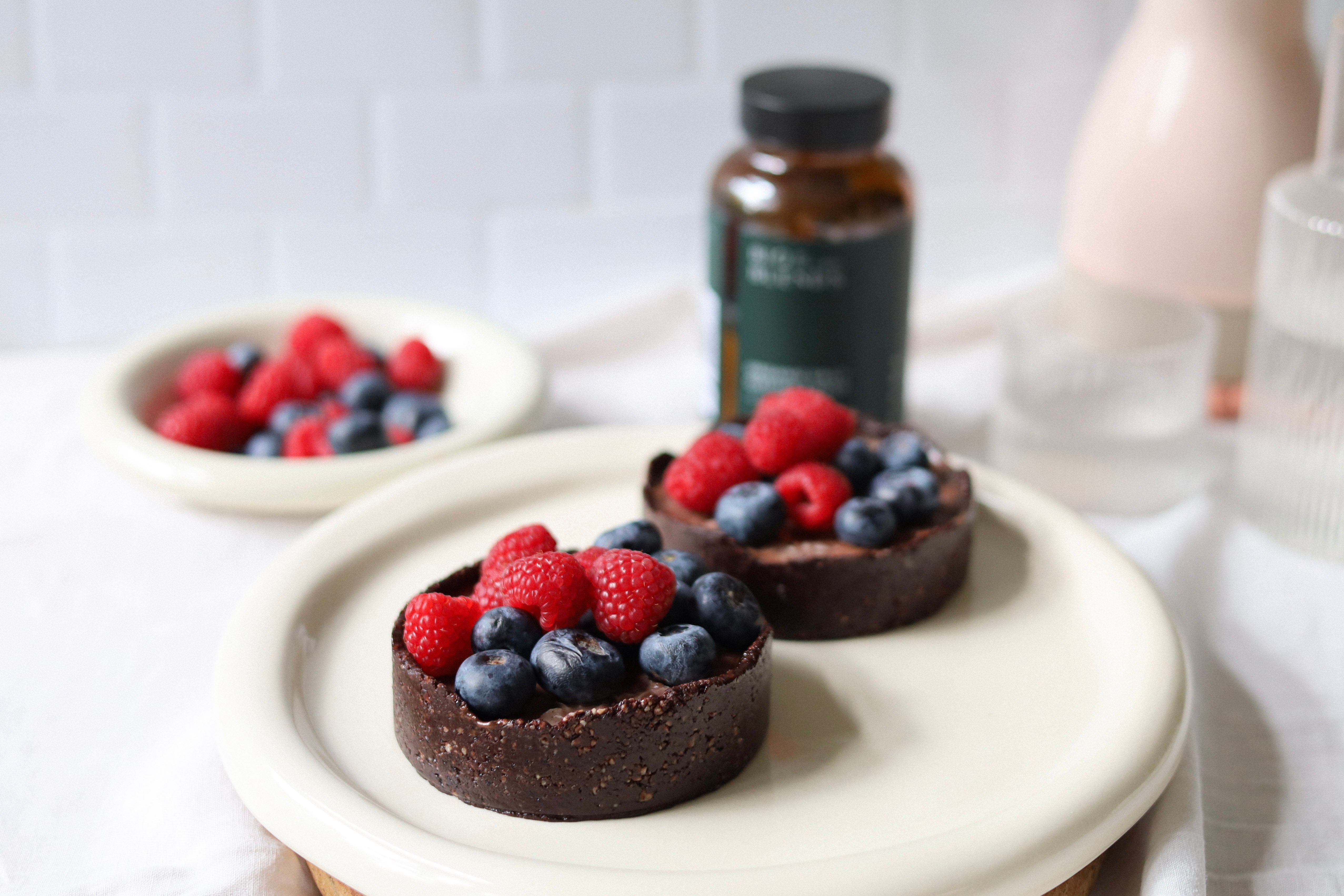
PCOS and the power of nourishing ovulation
If you’ve been told you have PCOS, or suspect you do, you’ve probably heard it explained as a “period problem”.
But PCOS (polycystic ovarian syndrome) is poorly named (and we don’t love that). Sure, cysts exist on the surface of the ovaries and ovulation is typically supressed – but why? It involves elevated insulin and androgens and these tend to be the drivers of the irregular ovulation via two hormones the pituitary gland in your brain makes, FSH and LH.
For some it feels like a complex, often misunderstood condition due to the involvement of other aspects of your endocrine system – including how your body manages blood glucose and insulin, inflammation and androgens, such as testosterone. Because the majority of progesterone is produced after ovulation (and this is suppressed or irregular in PCOS) a major goal of treatment is restoring ovulation so you receive all of the many benefits of cyclical progesterone production.
What’s really going on?
PCOS is affected by a combination of metabolic and hormonal challenges that tend to feed into each other, creating a cycle that can feel tricky to break. See these as guideposts for where to focus for healing:
- Insulin resistance – This is one of the most common features of PCOS. It means your body’s cells are not (currently) responding well to insulin, so your pancreas produces more. Higher insulin levels stimulate the ovaries to produce more androgens (male hormones like testosterone), which can disrupt ovulation and lead to symptoms like excess facial or body hair, acne and hair thinning on the scalp.
- Chronic low-grade inflammation – Women with PCOS often have markers of inflammation, which can keep the disruptions to the hormonal and metabolic health issues continuing.
- Elevated androgens – Higher testosterone and/or other androgens can lead to skin and hair changes, but they also interfere with the development of ovarian follicles, preventing eggs from maturing and being released (ovulation).
- Irregular or absent ovulation – Without regular ovulation, progesterone levels stay low as with an anovulatory cycle, there’s no ovarian production, only a small amount being produced by the adrenals. Low progesterone can impact mood stability, sleep quality and cycle regularity. Low/no progesterone is a consequence of PCOS, not a driver and one of the key reasons we seek to restore cyclical ovulation (by addressing insulin resistance, elevated androgens and inflammation).
We get it – this combination of metabolic challenges, inflammation and hormonal issues can affect far more than your menstrual cycle – influencing your mood, energy, sleep, skin and long-term health.
Why symptom suppression isn’t enough
Medications like the pill or metformin can be helpful in certain situations, but they don’t address the underlying drivers of PCOS. The new 2023–2024 international guidelines place a stronger emphasis on lifestyle and nutritional strategies as a first-line approach – particularly for women aiming to restore natural cycle regularity, improve fertility outcomes and support long-term health.
Nutritional and lifestyle approaches that can help PCOS
Improve insulin sensitivity with whole foods and movement Relatively stable blood glucose helps reduce insulin resistance, a key driver of PCOS symptoms. Focus on eating whole foods, minimal (or no) junk (ultra-processed foods), good quality protein, nourishing fats and fibre-rich vegetables at each meal. Pair this with regular movement – even short walks after meals can improve insulin sensitivity.
Reduce the elevated androgens The herbal medicine combination of Paeonia and Licorice is superb at addressing elevated androgens. Their synergistic effect also helps the pituitary communicate with the ovaries to better signal ovulation. They are a highly indicated herbal pairing for PCOS.
Support adrenal health and do what you can to address stress Chronic stress can drive excess cortisol and further disrupt healthy hormone balance. Incorporate daily stress-reduction practices such as conscious breathing, gentle movement, meditation, time in nature, or restorative yoga. Herbs such as Siberian ginseng can also help nourish the adrenal glands.
Encourage ovulation for healthy progesterone production Paeonia and licorice foster ovarian progesterone which in itself helps support cycle regulation, a healthy uterine lining and inner calm. Ensure adequate intake of nutrients like iodine, zinc and selenium alongside stress reduction and ovulation-friendly lifestyle habits.
Optimise zinc levels Zinc is essential to convert cholesterol into hormones, helping the production of estrogen, progesterone and testosterone. Food sources include oysters, red meat, eggs, sunflower seeds and pumpkin seeds. Supplementation can be helpful too.
Nourish with anti-inflammatory foods Lowering systemic inflammation supports better hormone balance. Emphasise a colourful variety of vegetables, berries, herbs, spices and omega-3-rich foods like wild-caught salmon, sardines and walnuts.
Prioritise sleep quality Restful, consistent sleep supports insulin sensitivity, appetite regulation and emotional resilience – all key for managing PCOS.
How Cycle Essentials can support your PCOS journey
Drawing from decades in clinical practice, Dr Libby designed Cycle Essentials to help address the key foundations of a woman’s monthly cycle. Women with PCOS often benefit from additional support – with a particular focus on supporting ovulation, reducing androgens, fostering insulin sensitivity, addressing stress – all of which help to optimise hormone production.
- Paeonia (peony) – Traditionally used (in combination with Licorice) to support healthy ovulation and the production of progesterone that ensues. For women with PCOS, this can mean more regular cycles and improved fertility outcomes, plus the natural anti-anxiety and diuretic effects that progesterone offers.
- Liquorice root – An adaptogen that helps modulate cortisol (the stress hormone) and support adrenal health. Combined with Paeonia, it also reduces androgens, one of the hinderances to ovulation. It’s also valuable for women experiencing symptoms like excess hair growth or acne on the face, neck, back or chest.
- Kelp (a natural source of iodine) – Iodine supports healthy thyroid function, as well as healthy ovaries and breast tissue. Thyroid hormones underpin robust metabolic health, energy and menstrual regularity. Thyroid health is often overlooked in PCOS yet can be a hidden contributor to irregular cycles and fatigue.
- Dong quai – Known as “female ginseng” in Traditional Chinese Medicine, this herb supports circulation, healthy menstrual flow and hormonal balance, which can be beneficial for women with irregular or absent ovulation. It is also indicated when there is pain with the menstrual cycle.
- Siberian ginseng – Another adaptogen that helps the body adapt to physical and emotional stress. Chronic stress can worsen insulin resistance and hormonal imbalance in PCOS, so supporting the adrenals to help foster resilience is key.
Together, these nutrients and botanicals work to:
- Support regular ovulation and healthy progesterone production
- Reduce androgens
- Improve stress resilience, insulin sensitivity and support adrenal health
- Optimise thyroid function for better energy, metabolic health and cycle regulation
- Encourage overall hormonal harmony




